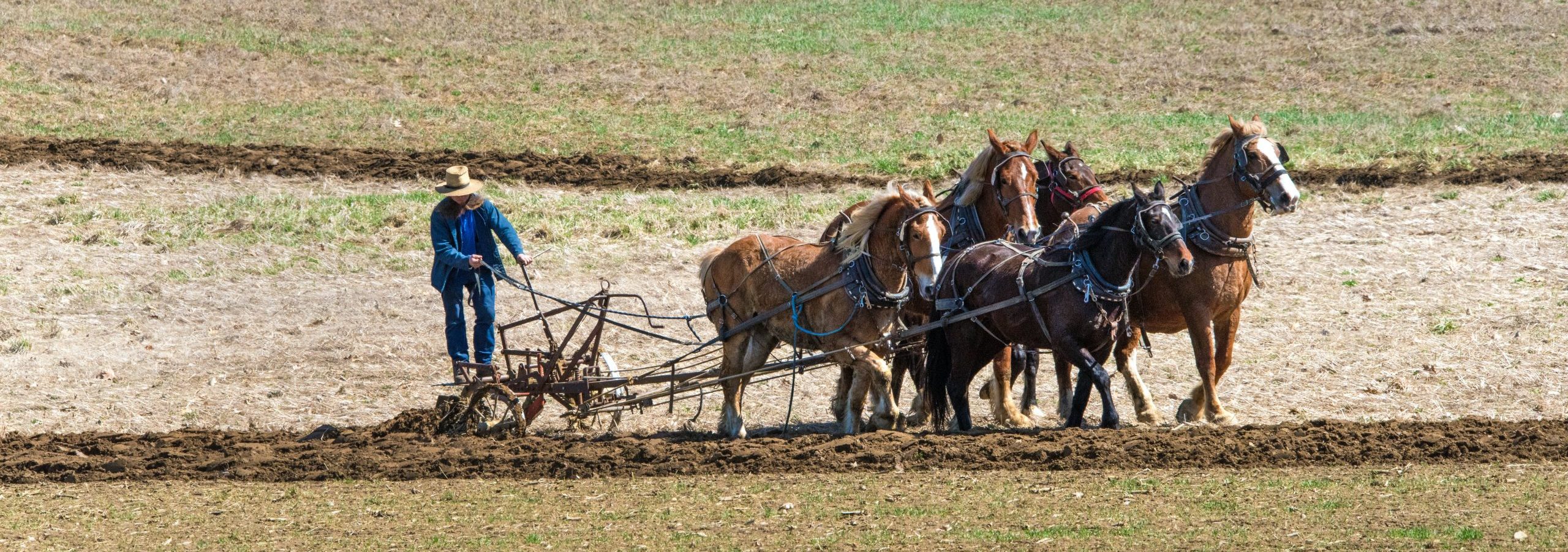

At 18 years of age, Jane Lucretia D’Esterre was a talented and beautiful young woman, entering the prime of her life. As she stood on the bank of a glistening, dark lake in Scotland, she pondered plunging into the depths, taking her life. She had lost all hope. The year was 1815, and her husband, John, had just been killed in a duel. He left her penniless, alone in a new country with two babies to care for. Her family lived in France, so she was without support of any kind: emotional, spiritual or financial.
As she gazed into the rippling waters of the lake and reflected on the pain and brokenness of her life, she looked up and spotted a young man on the other side of the lake, plowing furrows on the hillside. He was completely focused on his work, not aware of her eyes upon him as he guided the plow behind the horse with a single-minded purpose.
In her moment of despair, she was so impressed with the young plowman’s focus and concentration to do his work well that his well-timed example pulled her out of her own nightmare. Suddenly, she was infused with hope, receiving a timely dose of wisdom. She knew what she was supposed to do–move straight ahead as the young plowman, as she, too, had a meaningful task to fulfill. Her children needed her. They had lost one parent already and did not need to experience the agonizing loss of another.
When she processed the young man’s focus and commitment, she was given wisdom. Or to put it another way, she was given a wise heart. When her heart became wise, it then became brave to do the right thing, which was also the hardest thing to do.
A few weeks after this experience at the lake, Jane came to faith in Christ. Years later, she married Captain John Grattan Guinness, the youngest son of the famous brewer Arthur Guinness.
The prominent author Os Guinness, great-great-grandson of D’Esterre, made this observation:
If it had not been for the plowman, the tragedy of the dueling husband would have been followed by the tragedy of the duelist’s widow…
My great-great-grandmother was unusual for several reasons including the fact that she conscientiously prayed for her descendants down through a dozen generations. Ours is a heritage of faith, which I, for one, am extremely grateful.
When D’Esterre had been a teenager gazing into the deep, dark abyss of the lake, imagining her death, she could not see five generations ahead or any other descendants. All she could feel was that her life was finished. But it wasn’t finished. By looking at a purposeful young man plowing on a hill, she realized there was hope. She could take the path of the lake or she could take the path of moving ahead, in spite of her mind-numbing, emotional pain.
D’Esterre had no idea what the future held nor could she imagine she would ever have another husband who would deeply love her and her children. All she knew at that moment was that she could choose death or life. She had a choice to make that would impact not only her life, her children’s lives, but even the lives of her descendants.
Rarely do we fully realize the significance of the decisions and choices we make. They always bring consequences into our lives. It is your choices and decisions that determine the ultimate outcome of your life.
The prophet Isaiah says that we will all “eat the fruit of our actions.” (Isaiah 3:10)
King David describes our poor decisions as digging a deep hole and then falling into the hole. (Psalm 7:15) C.S. Lewis describes how a person falls into this hole: “He has tried to set up on his own, to behave as if he belonged to himself.” It is like the way the rock star Eric Burdon approached life, “It’s my life and I will do what I want.”
This is when we begin to dig deep holes, when we pay no attention to God and His will for our lives. Many people believe that if you defy God, He is going to smack you. However, in reality you end up smacking yourself. Most of the pain and sorrow we experience is because we break the fabric of God’s design and we end up reaping what we sow.
Psychologist Chris Thurman wrote an excellent book, The Lies We Believe. In the book he asks:
“Have you ever noticed how prominent sport stars’, businessmen, politicians’, and even ministers’ lives implode because of scandal and moral failure? In retrospect, in almost every case, we can clearly see the seeds of their downfall sown along the way.”
He says they usually begin with a small, seemingly innocuous action here and a careless behavior there. Thurman continues to say that you see:
“Small seeds of moral carelessness sown along life’s path that eventually grow into weeds of destruction.”
So, I leave you with two questions.
God is quite clear on this. He will not be mocked. We will, in fact, reap what we sow.
Add grace and understanding to your day with words from Richard E. Simmons III in your inbox. Sign-up for weekly email with the latest blog post, podcast, and quote.

For local orders in the Birmingham, AL area, enter Promo Code LOCAL at checkout to save shipping. We will email you when your order is ready for pickup.
Bulk discounts for 25 or more books! Call 205-789-3471 for prices.